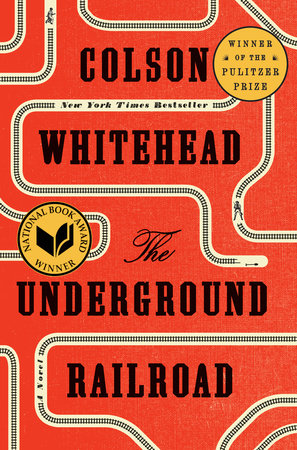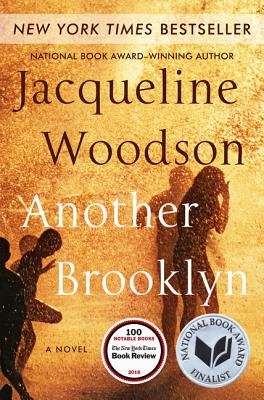3 Buzzed-About Books That Are Definitely Worth Your Time
by Jennifer Ridgway
As a parent, it’s so easy to get caught up in the things we have to do for our families, and all that “life” stuff, that we forget to make time for ourselves (that ubiquitous “self-care” we see cropping up in article headlines that pepper our Facebook feeds). For parents who are also book lovers, and want to stay up to date on the best new books, it can be especially hard. There just isn’t time to sift through all the new releases. In an attempt to save you some of that precious time, I’ve done the reading for you and picked out three new grown-up books worthy of your reading minutes.
-
Underground Railroad
Available from:In August, Oprah announced that she had chosen bestselling and Pulitzer Prize-winning author Colson Whitehead’s new novel, The Underground Railroad, as her latest selection for the Oprah Book Club. It had been some time since she had last chosen a book, but as she says, Underground Railroad “took my breath away … It’s kept me up at night, had my heart in my throat, almost afraid to turn the next page.”
Underground Railroad is the story of 16-year-old Cora, a slave on the Randall plantation in the antebellum South. Cora’s grandmother died on the plantation and her mother ran away, leaving Cora alone. After another slave, Caesar, approaches her about running away, Cora agrees, and sets off on a journey via the Underground Railroad. Whitehead has added a twist, though: The Underground Railroad in Cora’s story is an actual subterranean railroad, with station keepers who risk their own lives to keep it going. This reimagining of history allows the author to play with time and place — every stop Cora makes along the line brings us to a different, parallel version of the black experience during and after slavery. Each stop is a new version of the nightmare; we see Tuskegee-like experiments, forced sterilization, roads lined with black bodies hanging from trees, and neighbors turning each other in for hiding escaped slaves.
Whitehead did extensive research for Underground Railroad, including studying slave accounts, and he did not exaggerate the unforgettable and unconscionable brutality that he presents. As I flipped the pages, my heart pounded and my eyes brimmed with tears. At times I felt nauseated. Yes, this is a hard book to read — but it brings readers a greater awareness of our country’s history, as well as an added understanding of why our society is where it is today. It is easier to close our eyes to the past, but more courageous to open them, learn and acknowledge our history, and grapple with what it means.
I am still rooting for Cora and hoping she finds a better life, a life that all human beings deserve.
Also available from: -
Another Brooklyn
Jacqueline Woodson has some serious writing cred; she is currently serving as the Young People’s Poet Laureate and has won numerous writing awards, including the National Book Award for her free-verse middle grade memoir, Brown Girl Dreaming. Another Brooklyn is her first book written for adults in 20 years, and it is beautiful.
Another Brooklyn has a fluid timeline, most of it written as a flashback to a woman named August‘s youth in 1970s New York. When she returns to Brooklyn after her father’s death, August runs into one of her former friends, and her past comes rushing back. As August remembers her childhood, the neighborhood she grew up in becomes a character in and of itself, a different Brooklyn from the one we see today. Readers encounter white flight (the opposite of today’s gentrification), heroin addicts, and prostitutes — but also meet children playing in the streets and in the parks, parents trying to give their kids the best opportunities, and girls dreaming of becoming actors, dancers, and lawyers.
Woodson invites you to remember the friends you had as you were trying to discover who you were going to be. The friends who, as Woodson says, were there for you and loved you “always and all ways.” August remembers the good and the bad — first loves and teen pregnancy, dancing under the moon and abuse, parents who cared and parents who were gone. Though we may no longer be connected with those people and that life, they have still shaped and molded who we have become, as they have done for August.
Woodson’s book is short and a quick read — not even 200 pages — yet the writing is powerful and vivid. While not written in the free verse of Brown Girl Dreaming, Another Brooklyn still has a unique feel, and Woodson’s poetic ability shines through. White space separates paragraphs, forcing readers to slow down and savor her storytelling. While this was written for an adult audience, many of the younger readers who loved Brown Girl Dreaming will love Another Brooklyn, making for excellent parent-child reading and discussion.
-
No-Drama Discipline
Available from:Every parent I know seems to struggle with disciplining their children. What works? What’s age-appropriate? Am I doing more harm than good? Am I scarring them for life?
In the new paperback edition of No-Drama Discipline: The Whole-Brain Way to Calm the Chaos and Nurture Your Child's Developing Mind, experts Siegel and Bryson (the bestselling authors of The Whole-Brain Child) use research to illustrate the link between how we respond to our children’s misbehavior and how their brains are biologically impacted by the ways in which they are disciplined. In easy-to-understand language, the book proposes a “connect and redirect” tactic when your child has misbehaved or is in the midst of a meltdown. What does this mean? First, remember that your relationship with the child trumps any one behavior. Try to connect with your child and give them time to calm down, so they can hear what you are saying. Sitting with them and providing emotional and empathetic support can help them calm down. Brain science suggests that physically getting down on their level, instead of talking down to them, helps foster connection.
The authors suggest that when we send our children away during a tantrum, saying “pull it together and then come find me,” we send the message, “I only want to be around you when you’re happy and acting nicely.” Instead, we should try to stay with our children and communicate that we are always there for them, even at their worst (something that’s not always easy to do). A potential long-term benefit of this is your children trusting in you more, including down the line when they are teenagers and may need to talk to you about things they think will disappoint you. Once you and your child have calmed down, you can then move to redirect the child, which is when boundaries and consistency come into play. Talking with your child about what happened and including them in the discipline process helps them learn to make better decisions in the future, as well as helping them learn emotional intelligence.
Included in the back of the book is a “refrigerator cheat sheet” that recaps boiled-down basics of the book that your family can refer to in the future to help remember the strategies discussed. After reading No-Drama Discipline, I feel like I've come away with a doable “positive parenting” strategy and the compassion to realize that there is no “magic wand” to fix every problem every time. I will never parent 100% correctly 100% of the time … and that’s okay! The most important thing is to give your family the tools to communicate, and follow your instincts — they are your children, and you know them best!
Also available from:



